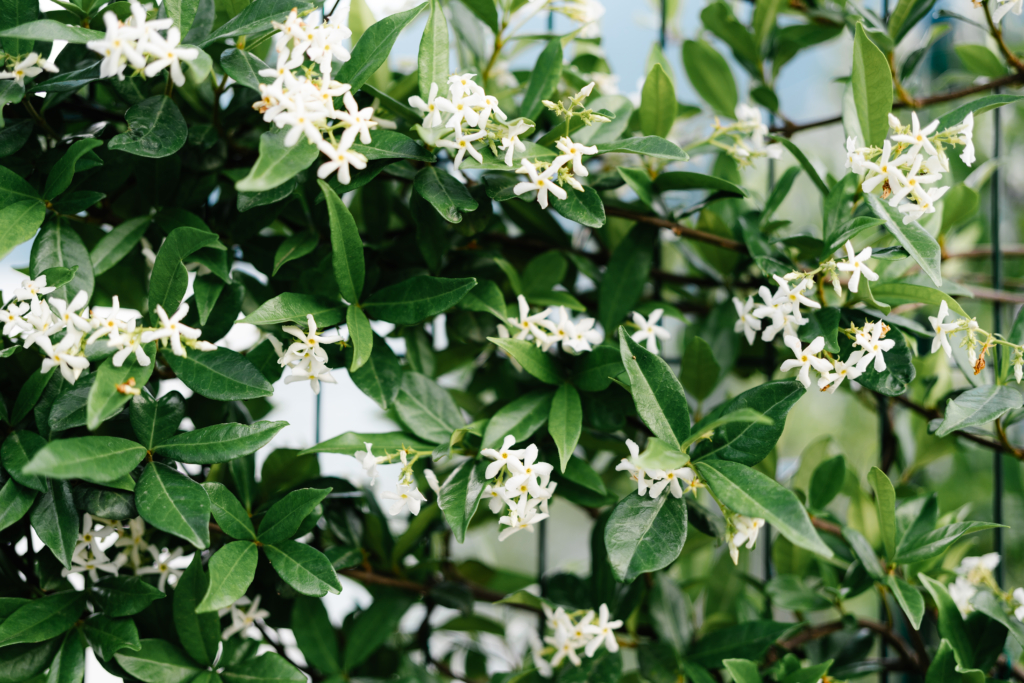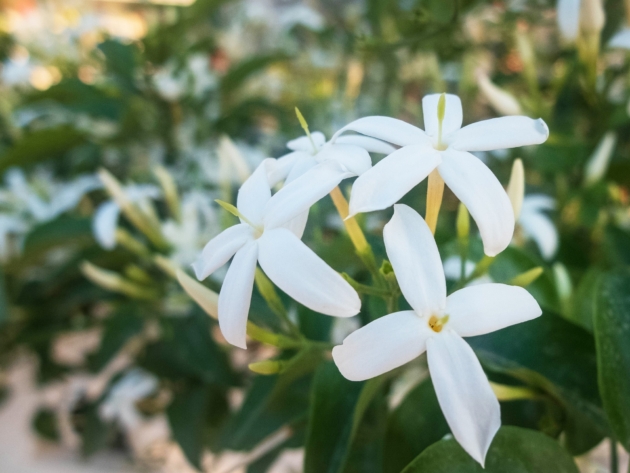The alluring aroma of Jasmine is more than just a scent – it’s an experience that lingers in the soul. Ethereal, intoxicating, and deeply evocative, Jasmine carries an almost sacred quality in the way it stirs the senses. Its Latin name, Jasminum, is derived from the Persian word Yasmin, meaning “Gift from God” – a fitting title for a flower whose fragrance feels like a divine offering. One breath of its blooming petals or rich essential oil is enough to transport you to a realm of stillness, beauty, and quiet reverence.
For thousands of years, Jasmine has been treasured in aromatherapy, natural perfumery, and herbal traditions. From its fragrant flowers to its roots and leaves, this plant has offered healing in many forms – physical, emotional, and spiritual. In this video blog, we’ll journey through the history and folklore of Jasmine; uncover its wide-ranging benefits for the mind, body, and soul; and share ways to bring its aroma into your daily life for deeper balance and well-being.
Jasmine Folklore & Botany
With over 200 species spanning both deciduous and evergreen varieties, Jasmine is a remarkably diverse and beloved genus. In aromatic medicine and perfumery, 3 species are most commonly used – often interchangeably – for their therapeutic and aromatic qualities: Jasminum officinale (Common Jasmine), Jasminum sambac (Arabian Jasmine), and Jasminum grandiflorum (Royal Jasmine).
Native to Southeast Asia and tropical northern India, Jasmine now thrives in warm, humid climates worldwide. It’s a hardy evergreen shrub that often climbs like a vine, reaching impressive heights of 30 to 40 feet and spreading with ease. Its deep green, oval leaves taper to elegant points, shining with the waxy luster so characteristic of evergreens.
Jasmine’s star-shaped blossoms are its crown jewel – blooming abundantly through summer, usually in pure white, though some varieties offer golden hues. These fragrant flowers are most potent at night, their perfume intensifying with the rise of the full moon, giving Jasmine its poetic title: “Queen of the Night.” Delicate and edible, the petals dissolve on the tongue and are often used to garnish dishes or enhance body care products with their beauty and scent. Jasminum sambac, in particular, is treasured for lending its unmistakable flavor and aroma to well-loved Jasmine green tea.
Across cultures, Jasmine holds deep symbolic meaning. In the Philippines and Indonesia, it is revered as a sacred flower, gracing ceremonies, adorning altars, and marking life’s most meaningful transitions, from birth and marriage to remembrance of the departed.
In Hindu tradition, Jasmine is closely linked to the goddess Devi, representing divine feminine energy and spiritual devotion. This sacred connection may also underlie Jasmine’s historical use in supporting reproductive health, where its gentle power has been believed to harmonize body and spirit alike. Jasmine’s cooling nature is renowned for its ability to soothe not only the physical body but also the emotional and mental landscape.

Jasmine Aroma Benefits
The Latin name, Jasminum sambac, directly translates to “Jasmine oil,” a testament to its long-standing role in both aromatic medicine and natural perfumery. For centuries, Jasmine oil has been revered not just for its exquisite fragrance but for its profound ability to soothe the mind and nourish the spirit. Its lush, intoxicating scent is known to open the heart, lift the mood, and instill a sense of deep peace and emotional equilibrium.
Jasmine’s naturally cooling properties make it especially effective for easing both physical and emotional heat. When fiery emotions flare up – whether as irritability, frustration, anger, or stress – Jasmine offers a gentle balm. It’s particularly helpful when anxiety arises from feeling overwhelmed or unable to control life’s unfolding events. In these moments, Jasmine doesn’t just calm the mind; it invites a sense of softening, helping you release the urge to control and instead trust the process of life.
This flower’s healing embrace extends to emotions and mood shifts linked to PMS and PMDD, encouraging the release of stored anger, resentment, or emotional patterns that no longer serve us. When you feel disconnected from yourself or unsure of your next steps, Jasmine’s essence can act as a compass, grounding, centering, and reminding you of your inner strength.
Scientifically, Jasmine has been shown to stimulate dopamine, the “feel-good” hormone, promoting feelings of happiness, satisfaction, and well-being. Its calming, mood-elevating properties have earned it a place in numerous studies, where it has been shown to reduce stress, anxiety, and depression, while also enhancing sleep quality. Jasmine is more than a fragrance – it’s a deeply healing ally for emotional and energetic renewal.
Traditional Medicine Uses

Jasmine Benefits for the Skin
Jasmine oil has long been cherished in body care formulations – from lotions and creams to body oils – for its ability to nourish and soothe dry, sensitive skin. Rich in moisturizing and anti-inflammatory compounds, this floral is especially helpful for calming hot, dry, or irritated skin. It’s often turned to for relief from conditions like eczema, dermatitis, and stress-related skin issues, making it a go-to for restoring balance and comfort to inflamed tissue.
Beyond skin care, the entire Jasmine plant – leaves, roots, and flowers – contains analgesic and anti-inflammatory properties that make it useful for easing physical discomfort. Jasmine is traditionally used topically to help relieve muscle and joint pain, backaches, menstrual cramps, and even nerve-related pain such as sciatica.
A time-honored tradition involves applying a cold infusion of Jasmine flowers to inflamed skin conditions like acne, boils, or psoriasis. To make this remedy, Jasmine flowers are steeped to make a tea, which is cooled and then applied with a soft cloth. For added relief, the cloth and tea can be chilled together before use.
Jasmine Tea Benefits
While Jasmine is most commonly celebrated today for its role in aromatherapy, this aromatic flower also has a long-standing tradition of internal use in ancient healing systems. Traditionally, a cold infusion of Jasmine flowers (Jasmine tea) has been sipped to cool and soothe inflamed tissues, thanks to the plant’s naturally cooling, anti-inflammatory, and astringent properties.
This gentle infusion has been especially valued for easing hot, inflammatory internal conditions such as Crohn’s disease, ulcerative colitis, inflammatory bowel disorders, and even rheumatoid arthritis, where its ability to tone and calm irritated tissues offers welcome relief. In Traditional Chinese Medicine, Jasmine flowers have been used internally to support liver function and purify the blood, while the root is traditionally used to ease insomnia, headaches, and general pain.
Important Note: Jasmine essential oil is for external use only. It should never be consumed, as it can be highly irritating to the delicate tissues of the digestive tract.
Jasmine Benefits for Reproductive Health
Jasmine flowers have long been valued for their ability to support hormonal balance and ease menstrual discomfort. As an antispasmodic with anti-inflammatory and analgesic properties, Jasmine helps relax smooth muscle tension, making it a traditional remedy for menstrual cramps and even labor pain.
Traditionally, Jasmine has been used externally in a variety of healing preparations, including poultices, massage oils, and soothing herbal salves. A Jasmine poultice is made by gently crushing fresh or dried blossoms into a paste, then applying it to the lower abdomen and securing it with gauze, offering localized comfort and support where it’s needed most.

Beautiful Ways to Use Jasmine

Deepen Your Relationships to Plants, One Plant at a Time
This video and plant profile are just a glimpse inside our Aromatic Medicine Garden library. What you're seeing is a short excerpt from the full-length, 1+ hour video and 15-page in-depth plant monograph. Inside the Aromatic Medicine Garden, our immersive online membership, you’ll unlock our entire medicine cabinet and find:
🌿 Extensive Plant Talk video lessons
🌿 Beautifully detailed plant profiles
🌿 Step-by-step herbal preparation tutorials
🌿 Foundational teachings in aromatic plant science & folklore
🌿 Expert cultivation and wild-harvesting tips
🌿 Healing recipes, rituals, and so much more
Whether you're just starting your journey or deepening your plant wisdom, the Aromatic Medicine Garden is your portal to empowered, holistic healing. Join the waitlist and be the first to know when the garden doors open next!
Jasmine Plant Profile
Latin Names: Jasminum officinale, Jasminum sambac, and Jasminum grandiflorum
Other Common Names: Common Jasmine, Royal Jasmine, Arabian Jasmine, Gift from God, Queen of the Night
Genus: Jasminum
Plant Family: Oleaceae (Olive)
Parts Used: flowers, leaves, root
Herbal Energetics and Actions: alterative, analgesic, anodyne, anti-inflammatory, antibacterial, antidepressant, antifungal, antiseptic, antispasmodic, aphrodisiac, astringent, calmative, cooling, euphoriant, expectorant, nervine, sedative, uterine tonic, vulnerary
Body Systems Affiliation: nervous system, reproductive system, integumentary system (skin)
Aroma: rich, sweet, fruity, musky, earthy
Video featuring Erika Galentin

© 2025 The Northwest School of Aromatic Medicine. All rights reserved.
*The statements above have not been evaluated by the FDA, and are for educational purposes only. This article is not intended to diagnose, treat, cure, or prevent any disease. This article should not be taken as medical advice. Please consult your physician before you use this information for health purposes.
